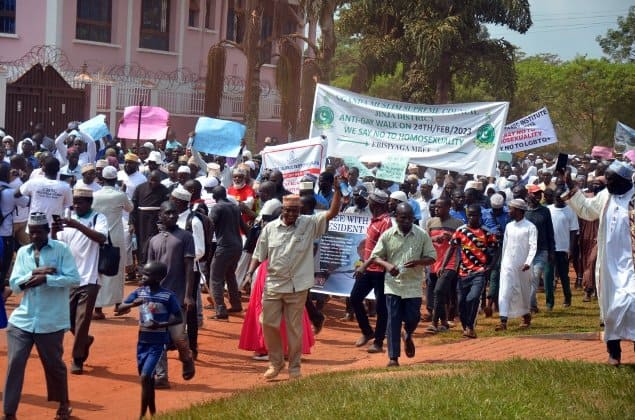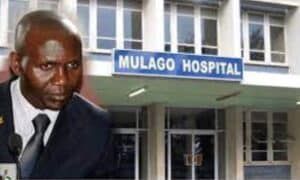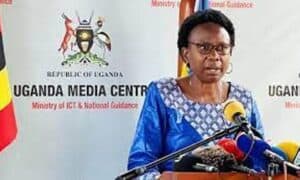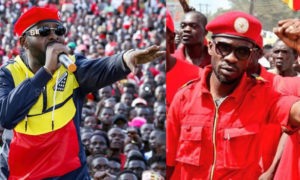The panel code criminalizes homosexuality, but court battles have exposed loopholes within the law, prompting the anti – gay crusaders to come up with ways of plugging these gaps.
However Serial litigant Hassan Male Mabirizi has sued the Speaker, Attorney General, the Deputy Speaker and Bugiri Municipality MP Asuman Basalirwa, the sponsor of the Anti-Homosexuality Bill 2023, in an attempt to stop Parliament from processing the Bill contending, among others, that the Penal Code is enough.
Homosexuality in Uganda is illegal under Section 145 of the Penal Code.
The section stipulates accordingly: “Any person who— has carnal knowledge of any person against the order of nature; has carnal knowledge of an animal; or (c) permits a male person to have carnal knowledge of him or her against the order of nature, commits an offence and is liable to imprisonment for life.” With that in mind, activists have opposed the Anti- Homosexuality Bill on grounds that section 145 is sufficient.
“…the Bill as is, unless a totally new one was written, (was) premised on lies and driven by populism, opportunism and hypocrisy, and accepted by the masses because of ignorance. There are better laws on the Penal Code if only they can be enforced; it breaches the Constitution and is a trap intended to culminate into the legalisation of homosexuality,” However,Pastor Solomon Male!who is famous for his anti-homosexuality stance, said in his dossier to the Ugandan Parliament copied to the Speaker of Parliament Anita Among; Mathias Mpuuga, the Leader of Opposition, and Bugiri Municipality MP Asuman Basalirwa who drafted the bill.
Yet in the preamble of the Bill, the drafters says that legislation is designed to address the gaps in the provisions of other laws, citing the Penal Code Act. They say the Penal Code Act, chapter 120 has no comprehensive provision catering for anti-homosexuality.
Rather, they say, it focuses on unnatural offences under section 145 and lacks provisions for penalising the procurement, promoting, disseminating literature and other materials concerning the offences of homosexuality.
“There is need for a legislation to enhance offences relating to homosexuality and clear provisions for charging, investigating, prosecuting, convicting and sentencing of offenders,” the promoters of the Bill say, adding that this legislation seeks to supplement the provisions of the Constitution and the Penal Code Act, chapter 120 by criminalizing same-sex sexual acts and related acts.
The Bill further seeks to prohibit marriage between persons of the same sex; penalise homosexual behaviour; prohibit the promotion of homosexuality; protect victims of homosexuality and ensure their compensation .
The effort to widen the scope of the homosexuality law seem to have been a result of precedent in which pro- homosexuality groups tried to take advantage of loopholes within the law.
For instance, in 2012, pro homosexuality personalities: Jacqueline Kasha Nabagesera, Julian Pepe Onziema and Geoffrey Ogwaro organised a workshop in Entebbe.
According to the organisers, the workshop which was organised under the auspices of Freedom and Roam Uganda (FARUG) , a non- governmental organisation, was to train and equip participants with project planning, advocacy, human rights, leadership and business skills.
These plans were upended when Fr Simon Lokodo, then the minister of Ethics and Integrity, ordered the police to disperse the gathering, saying it was an illegal gathering of homosexuals. The organisers decided to sue the Attorney General saying the closure of the workshop was unjustified and constituted an infringement of their fundamental rights and freedoms.
The legal team of the pro- homosexuality campaigners contended that section 148 of the Penal Code Act only prohibits homosexual sex acts. That there are no related offences which are committed by aspersion, suggestion, innuendo or apparent association. They argued that Lokodo’s affidavit doesn’t show that the workshop participants committed any criminal offence as described under Section 145 of the Penal Code Act.
They said since the participants were not found engaging in homosexual acts nor did they show intent to commit the acts, there was no crime committed.
under Section 145 of the Penal Code Act and therefore the closure of the workshop could not be construed as a legitimate attempt to prevent the commission of a criminal offence.
In the name of protecting moral values. The Attorney General’s defence was that Lokodo, had been established that the workshop aimed to encourage participants to practice and promote homosexuality.
In the end, Justice Steven Musota, agreed with the Attorney General, saying Lokodo acted in public interest. The applicant’s lawyers had asked Justice Musota to adopt the approach taken by the European Court on Human Rights as analogous, saying it is a compelling basis for interpreting Article 29 of the Ugandan Constitution but the judge didn’t agree.
The Europeans Court on Human Rights approach, Justice Musota said, should be viewed in the context that there is no member country of the European community that prohibits homosexual acts.
“Uganda and Europe have different laws and moral values and accordingly define their public interests differently. As rightly put by learned counsel for the respondents, Uganda is not signatory to the European Convention on Human Rights,” Justice Musota said, adding that such precedents are not binding but must be read in a manner consistent with Ugandan laws and norms.
Seeking tougher law
Despite that victory, anti- homosexuality campaigners advocated for a law that would specifically punish the promotion of homosexuality and that would include criminally penalizing them for organising workshops and press conferences. The 2008 Bill that provided provisions that prohibit the promotion of homosexuality was struck down by the Constitutional Court on grounds that Parliament passed it without quorum.
The current Bill if passed into law, will still target the promotion of homosexuality since it breaks down the promotion as person who—participates in production, procuring, marketing, broadcasting, disseminating, publishing of pornographic materials for purposes of promoting homosexuality; funds or sponsors homosexuality or other related activities; offers premises and other related fixed or movable assets for purposes of homosexuality or promoting homosexuality; uses electronic devices which include Internet, films, mobile phones for purposes of homosexuality or promoting homosexuality; or who acts as an accomplice or attempts to promote or any way abets homosexuality and related practices.
People who promote homosexuality are liable, on conviction, to a fine not exceeding five thousand currency points or imprisonment for a term not exceeding five years, or both. The Bill also targets organisations when it stipulates – where the offender is a corporate body, a business, an association or an NGO – the director, proprietor or promoter shall serve the five years or fine if not both. The court, the Bill says, shall on conviction of the offender, order the cancellation of the certificate of the registration of the said organisations.
A victory for homosexuality in court
In 2010 the pro-gay activists had a victory in court over defunct tabloid Rolling Stone which had published a story under the headline “ Hang them; they are after our kids. The applicants argued that Rolling Stone’s move to call for the hanging of homosexuals or people perceived to be homosexuals coupled with a threat of violence amounted to a threat of death. The applicants also accused Rolling Stone of intruding into their privacy. The defence by Rolling Stone was that the applicants who included Nabagesera, Onziema and David Kisuule were not entitled to any remedies since the tabloid published the story in an effort to fight homosexuality which is forbidden by the Penal Code.
Justice Vincent Musoke Kibuuka ruled that exposure of identities of persons and homes of the applicants for purposes of fighting homosexuality threaten their right to privacy. Justice Musoke Kibuuka observed that the case wasn’t about homosexuality per se, rather fundamental human rights. Despite Rolling Stone’s contention that section 145 of the Penal Code criminalizes every gay person, Justice Musoke Kibuuka, said that is not the cases.
“The scope of section 145 is narrower than gayism generally. One has to commit an act prohibited under Section 145 in order to be regarded as criminal,” Justice Musoke- Kibuuka ruled before concluding that the tabloid had violated the rights of the applicants.
The judge issued a restraining order against the tabloid.
With such a judgement, the anti-homosexuality campaigners have been eager to expand the law that criminalizes homosexuality.












